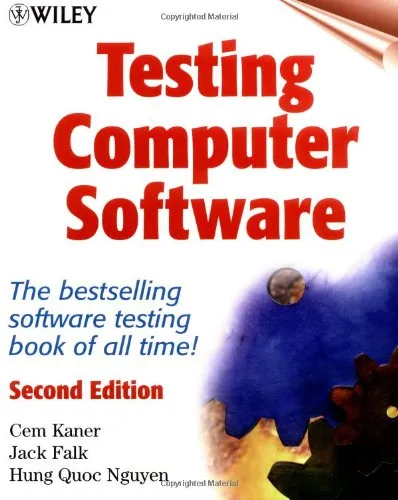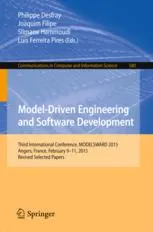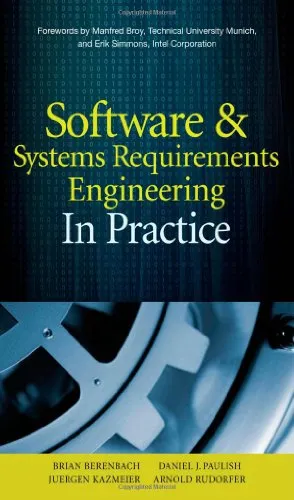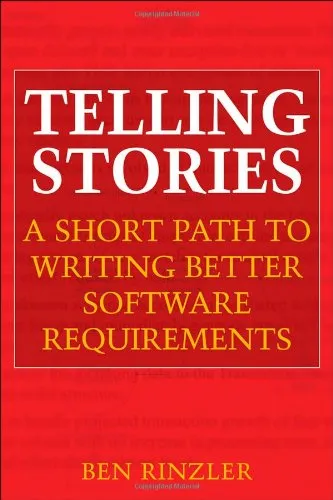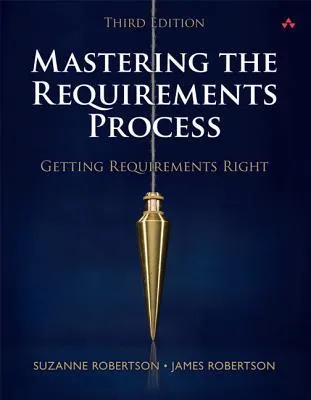Managing software requirements: a unified approach
4.5
بر اساس نظر کاربران

شما میتونید سوالاتتون در باره کتاب رو از هوش مصنوعیش بعد از ورود بپرسید
هر دانلود یا پرسش از هوش مصنوعی 2 امتیاز لازم دارد، برای بدست آوردن امتیاز رایگان، به صفحه ی راهنمای امتیازات سر بزنید و یک سری کار ارزشمند انجام بدینکتاب های مرتبط:
معرفی کتاب "Managing Software Requirements: A Unified Approach"
کتاب "Managing Software Requirements: A Unified Approach" یکی از منابع برجسته و جامع در حوزه مهندسی نیازمندیهای نرمافزار است که توسط "Dean Leffingwell" و "Don Widrig" نوشته شده است. این کتاب راهنمایی گامبهگام برای مدیران پروژه، تحلیلگران نیازمندیها، توسعهدهندگان و ذینفعان پروژههای نرمافزاری ارائه میدهد تا بتوانند فرایند مدیریت و تحلیل نیازمندیهای پروژه را بهصورت سیستماتیک و کارآمد انجام دهند.
خلاصه جامع کتاب
کتاب درک جامعی از روشها و ابزارهایی ارائه میدهد که به تیمهای نرمافزاری کمک میکند تا نیازمندیها را با دقت جمعآوری، تحلیل، مستندسازی و مدیریت کنند. این اثر با تأکید بر اهمیت ارتباطات موثر بین تیمها، به خواننده نشان میدهد چگونه میتوان نیازمندیها را از ذینفعان بهصورت شفاف کسب کرد و سپس آنها را به راهحلهای فنی ترجمه نمود. از مفاهیم ابتدایی مانند تعریف Requirement و نقشهای مختلف در چرخه حیات پروژه، تا موضوعات پیشرفته مانند استفاده از Use Caseها و Agile، در این کتاب پوشش داده شدهاند.
نویسندگان همچنین بهخوبی بر اهمیت تعاملات میان نقشهای مختلف در یک پروژه نرمافزاری تاکید کردهاند و نشان دادهاند که چگونه یک تیم میتواند مستندات Requirements خود را به محصولی قابل اطمینان تبدیل کند. مدلها، ابزارها و تکنیکهای معرفی شده در این کتاب بهگونهای طراحی شدهاند که بتوانند در سازمانها و تیمهای مختلف، چه کوچک و چه بزرگ، قابل اجرا باشند.
نکات کلیدی کتاب
- توضیح جامع و عملی از چرخه مدیریت Requirements
- نقش Use Case Modeling در درک نیازمندیها و انتقال آنها به تیمهای فنی
- ارائه روشهای مستندسازی و سند Requirements شامل Functional و Non-Functional Requirements
- چگونگی مدیریت تغییرات در نیازمندیها در طول یک پروژه
- شناخت اشتباهات رایج در مهندسی نیازمندیها و نحوه اجتناب از آنها
جملات مشهور از کتاب
"You can’t build what your customer wants if you don’t know what they need."
"Good requirements don’t add complexity to a project; they reduce it."
چرا این کتاب مهم است؟
کتاب "Managing Software Requirements: A Unified Approach" از اولین منابعی است که به شکلی مدون و عملیاتی به مدیریت نیازمندیهای نرمافزاری با استفاده از ابزارها و تکنیکهای مدرن پرداخته است. امروزه با پیچیدگی روزافزون پروژههای نرمافزاری، دستیابی به موفقیت بدون مدیریت دقیق نیازمندیها عملاً غیرممکن است. خواندن این کتاب به افراد و تیمهایی توصیه میشود که به دنبال ارتقاء مهارتهای خود در زمینه جمعآوری و تحلیل نیازمندیها هستند. علاوه بر این، این کتاب با پوشش جامع خود میتواند بهعنوان یک منبع اصلی در دورههای آموزشی و کارگاههای مهندسی نیازمندیها مورد استفاده قرار گیرد.
اگر به دنبال آن هستید که چالشهای ناشی از سوءتفاهم در نیازمندیها و تغییرات پروژه را مدیریت کنید، این کتاب ابزارها و رویکردهای لازم را در اختیار شما قرار خواهد داد.
Introduction
Managing requirements is one of the most critical aspects of software development, yet it is often the most overlooked or misunderstood discipline. "Managing Software Requirements: A Unified Approach", written by Dean Leffingwell and Don Widrig, offers a comprehensive guide to help individuals and organizations bridge the gap between business needs and development efforts. Targeted at software developers, business analysts, project managers, and stakeholders, this book presents a systematic framework for effectively capturing, analyzing, and managing software requirements, ensuring projects deliver what users need and expect.
In this introduction to the book, we'll explore its detailed summary, key takeaways, famous quotes, and reasons why this book remains vital to the software development community. Filled with practical advice, real-world examples, and a unified process model, this book empowers teams to succeed in a demanding industry where clear requirements can determine success or failure.
Detailed Summary of the Book
"Managing Software Requirements: A Unified Approach" emphasizes the importance of thoroughly understanding and documenting what users and stakeholders want before diving into development. The book introduces a unified approach that blends principles from various models, such as systems engineering and Agile software development, to create a practical and flexible requirements management methodology. The authors focus on providing teams with techniques they can adapt, regardless of the complexity of their projects or the size of their organizations.
The book begins with foundational concepts, defining critical terms like "requirements," "stakeholders," and the "software lifecycle." It then dives into discovering, analyzing, and documenting requirements, showcasing best practices along the way. Techniques for gathering insights, including user interviews, prototyping, and use-case modeling, are detailed to ensure accuracy and clarity in capturing the customer's voice. The authors also highlight the importance of managing both functional and non-functional requirements, ensuring the finished software performs as expected in real-world conditions.
A significant portion of the book is dedicated to managing the inevitable changes that occur in any development project. The authors discuss change control processes, prioritization strategies, and the tools teams can use to stay agile while maintaining accountability. Furthermore, the book provides guidance on how to incorporate a requirements management framework into an organization's existing processes smoothly, making it easier for teams to adopt and sustain.
Key Takeaways
- Effective requirements capture and management are critical to the success of software projects.
- A "one size fits all" approach doesn't work—methods must be adaptable to the project and team.
- Clear communication with stakeholders is essential for understanding and validating requirements.
- Both functional and non-functional requirements need equal attention to ensure a robust product.
- Using tools and frameworks for requirements management enhances organization and accountability.
- Change is inevitable—plan for it with structured processes and adaptable strategies.
Famous Quotes from the Book
"Inadequate requirements are the single most common reason for project failure."
"Good requirements form the foundation upon which successful software is built."
"The best systems emerge not from brilliant design but from understanding what the users truly need."
Why This Book Matters
The significance of "Managing Software Requirements: A Unified Approach" lies in its ability to bridge the communication gap between technical teams and business stakeholders. The authors have carefully crafted a guide that not only helps professionals master the art of requirements gathering but also fosters collaboration and accountability across teams. By following the principles outlined in this book, organizations can reduce development risks, improve product quality, and deliver solutions that meet or exceed user expectations.
In an era where software drives business innovation and productivity, managing requirements effectively has become a critical skill. This book empowers readers to rise above the challenges of unclear stakeholder needs, scope creep, and shifting priorities, enabling them to consistently deliver software that generates value. Whether you're a seasoned professional or new to requirements engineering, the timeless lessons in this book make it an essential read.
دانلود رایگان مستقیم
شما میتونید سوالاتتون در باره کتاب رو از هوش مصنوعیش بعد از ورود بپرسید
دسترسی به کتابها از طریق پلتفرمهای قانونی و کتابخانههای عمومی نه تنها از حقوق نویسندگان و ناشران حمایت میکند، بلکه به پایداری فرهنگ کتابخوانی نیز کمک میرساند. پیش از دانلود، لحظهای به بررسی این گزینهها فکر کنید.
این کتاب رو در پلتفرم های دیگه ببینید
WorldCat به شما کمک میکنه تا کتاب ها رو در کتابخانه های سراسر دنیا پیدا کنید
امتیازها، نظرات تخصصی و صحبت ها درباره کتاب را در Goodreads ببینید
کتابهای کمیاب یا دست دوم را در AbeBooks پیدا کنید و بخرید
1726
بازدید4.5
امتیاز0
نظر98%
رضایتنظرات:
4.5
بر اساس 0 نظر کاربران
Questions & Answers
Ask questions about this book or help others by answering
No questions yet. Be the first to ask!


